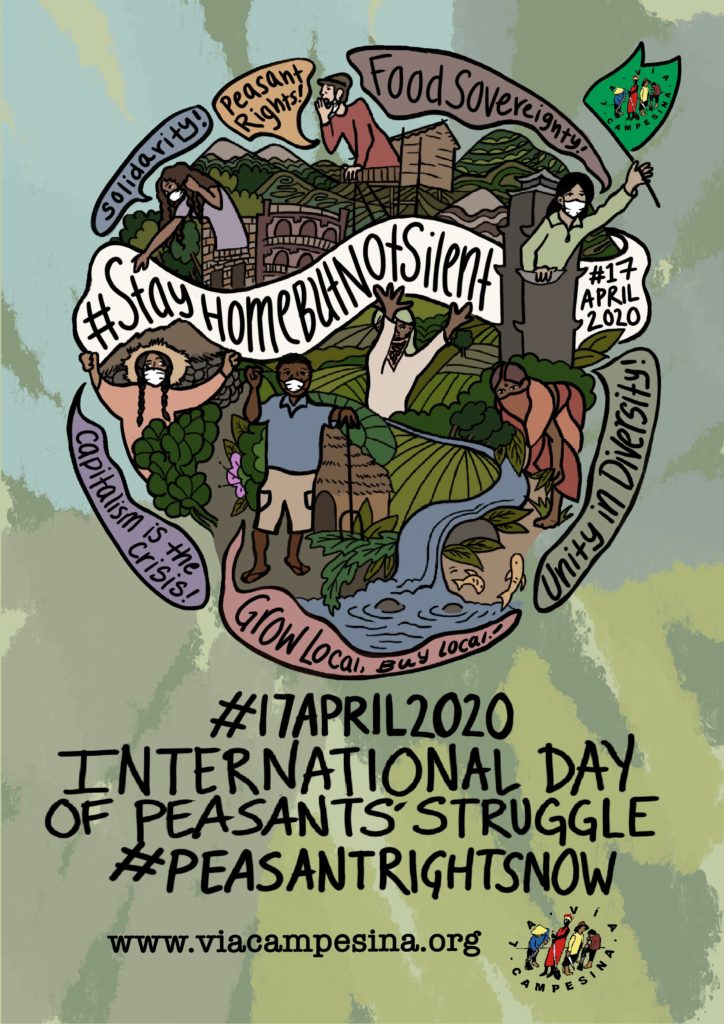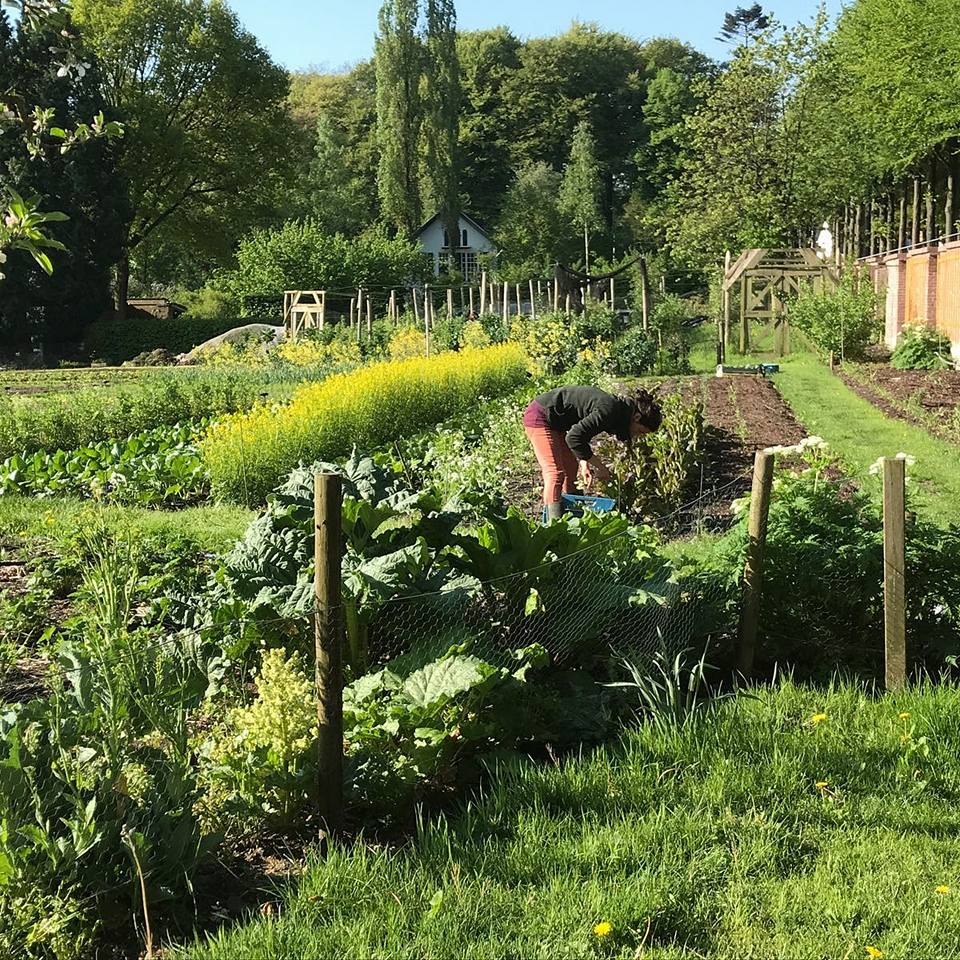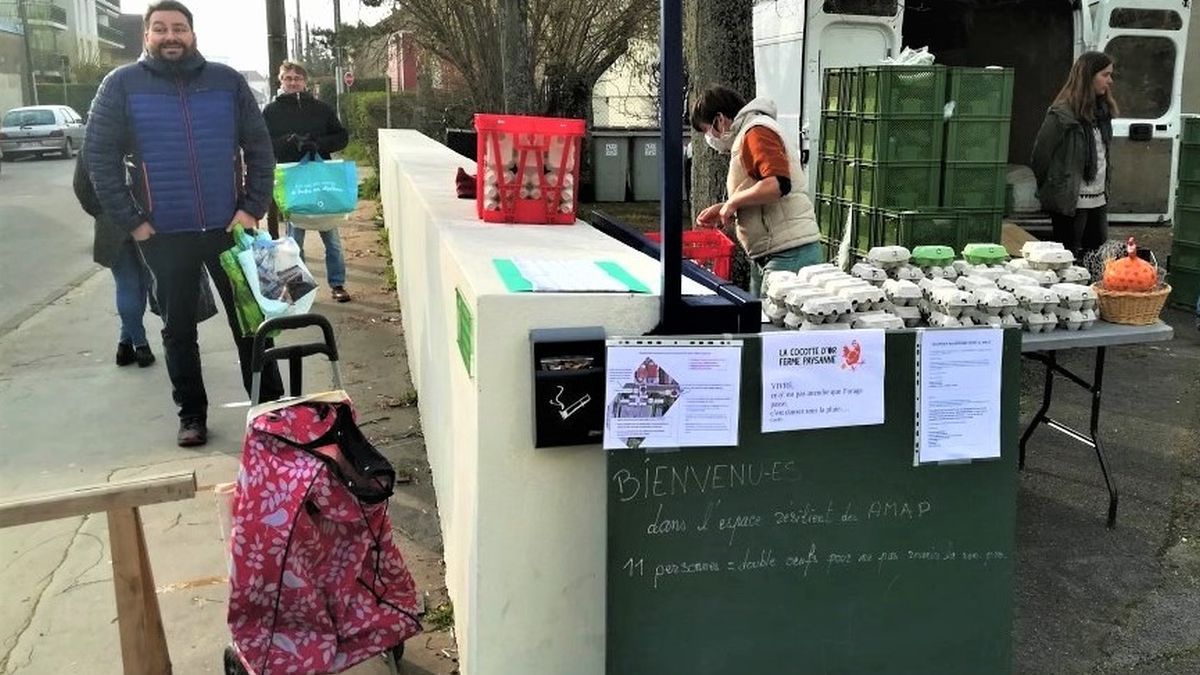 Today, April 17, is the International Day of Peasant Struggle – a day to highlight the persecution and violence suffered by peasants and farmers around the world on a daily basis as a result of neoliberal policies.
Today, April 17, is the International Day of Peasant Struggle – a day to highlight the persecution and violence suffered by peasants and farmers around the world on a daily basis as a result of neoliberal policies.
This year, peasants face a new challenge of yet another sanitary crisis. Our focus is on France and the Netherlands, but we acknowledge the diversity of contexts in this crisis, and give our support to every peasant struggling worldwide for a better agriculture.
French agriculture in quarantine: the emergency to reshape our food system.
The Covid-19 crisis shows how vulnerable our societies are. If the crisis affects many societal aspects, agriculture is in the top notch position, both for farmers and the population.
Our current food system is based on exportations and importations. France is the 6th exporter of Europe, and since 2000, importations have increased so much that 50 percent of the vegetable and fruits comes from outside France. A study conducted by senators on agriculture and alimentation in 2019 shows that the agricultural surplus could turn in deficit before 2023. This agricultural model relies on trade, therefore is not resilient when crises like Covid-19 happen.
France’s exportations are mainly wine and cereals. With the current crisis, Schengen’s borders and those between some other countries in Europe are closed. Agricultural goods can still be transported, but what we face now is very likely to happen over and over again and farmers will eventually have to deal with a lack of distributors in foreign countries, leaving France with a great excess of wine, wheat and cheese.
In exchange, we import vegetables and fruits that could perfectly grow on French soil. Land used to intensely produce cereals could be allocated to grow food for local markets.
This would reduce pollution induced by transportation and ensure farmers more stable incomes on the long term. More than stopping production of these leader products, the challenge is to diversify the production in one farm. Agriculture is divided into strict sectors leaving farmers without any protection if their main crop or production fails one way or another. Diversifying would also give great ecosystem services, but this is another topic requiring way more than just a sentence.
France, as many countries, is not self-sufficient on food. Terre de lien, an association which encourages young people to settle down as farmers, came up with the number of 1 190 000 peasants if France needed to feed its population, against only 600 000 today.
This number takes into account the wide variety of food that would need to be produced. In a landscape of protein transition, farmers should be encouraged to grow more nutritious food as nuts, beans and other replacement for meat, which is largely imported from abroad.
The big scale farms are still seen as more profitable and secured, because of the amounts they produce. But the current sanitary crisis shows us that we cannot prevent events, natural or sanitary, from happening. Technology will not save us at any rate and we need to take a step back to rethink our model.
To be resilient, we need to build a balanced food system. This entails encouraging ecological transition for farms, and an improvement of the rural livelihoods.
Another main issue with the Covid-19 situation is the lack of workforce. Each year, nearly 70 000 posted workers, mainly from eastern Europe. These workers come through service providers and the social benefits charges are those from their home countries. If it is regulated in most cases, a lot of illegal employment is still going on.
This year, these workers will not be able to come, creating a shortage of job and income for them and a huge lack of labour in the French fields. However, this problem concerns mainly large-scale farms and smaller farms would need subventions more than labour.
In order to face these new challenges, we need to reshape our food system. In this mayhem, one type of farmer seems to do quite well. Farms working as CSA (community supported agriculture) have growing demands of membership and can go on with the distributions.
The most common form of CSA in France is the AMAP, literally “Association for the support of a peasant agriculture”. They consist in weekly vegetable boxes that people can collect at the farms or somewhere else. The members pay the farmer no matter what’s inside the box and for a definite time, so that the farmer has an insurance of income. In this crisis, this type of food distribution is ideal. It does not require to meet in large groups and social distancing is perfectly possible. But mostly, it safeguards and conveys a strong sense of solidarity in the community.
Farmers have to come up with new ways to distribute food.
Social contact and connection between producer and consumer is very important, especially in this case. We have seen videos of people fighting for food in supermarkets and the growing sales of guns in the US, as if we were completely at war already. People can be in frenzy in these stressful times, built up by decades of competition between all layers of society. On a long-term scale, this is dangerous, we urgently need to recreate a link to our source of food.
Let’s hope this crisis make us reflect on the global competition logic we need to escape.
This is a video made by 9 agronomy students in France:
What is the situation in the Netherlands?
As can be expected, the agricultural sector in the Netherlands faces the same kind of issues during the Corona-crisis as France. Both countries are mainly export-driven. But the main export products are different. In the Netherlands, for example, the flower production is one of the biggest export-driven sectors. A couple of weeks into the crisis, the Dutch flower growers are starting to prematurely harvest and destroy their flowers and flower bulbs. Millions of tulips are being thrown away, and the international trade of lilies is expected to suffer long-term losses. The losses of the flower bulb sector are estimated to amount to 160 million euros.
The total cost for the Dutch agricultural sector is expected to be around 5 billion euros in the next couple of months, of which 2 billion euros will be made in greenhouse horticulture. An industry that has been covered in the news several times in the last couple of weeks, is that of the potato farmers that deliver potatoes for French fries. In the Netherlands, they mainly deliver to catering businesses, which are now, temporarily, out of business. About one million ton of potatoes will not be able to get processed, which amounts to a loss of 160 – 200 million euros. The farmers are expected to dispose of the surplus potatoes in a responsible manner, although they make additional costs while doing so. Part of the potatoes can be used as fodder, processed into biogas and brought to food banks.
It is clear from all these examples, that an export-focused, highly industrialized agricultural system, that mainly consists of monocultures of a handful of crops, is not resilient in crises such as the current one. Farmers see their income disappear, and even more food is wasted than in “normal” times. Diversified farming systems that produce primarily for the local environment are able to generate a steady income, whatever changes in the global situation.
However, this doesn’t mean that the peasant way of farming is unharmed during the Corona crisis. Many agroecological farms valorise social interactions on farm level, in the form of, for example, tea gardens or events. For some of them, this provides a necessary additional income as they don’t earn enough by selling their produce because of the competition with low supermarket prices. As group gatherings are now not allowed for safety reasons, some of these farms come to struggle financially.

De Ommurde Tuin in Renkum, CSA and tea garden
Another sustainable farming system that is typical for the Netherlands, is the care farm. As their main focus is the social goal of helping vulnerable people, they face many challenges during the Corona crisis. They are now only allowed to host the people who don’t have any other options. Because these people often belong to the risk group, the employees who don’t have a specific care-related function, are sometimes not allowed to come to work anymore, which in its turn leads to losses in the food production of the farm.
What we can learn from all of this, is that small-scale, local farms are a more stable system in times of crisis, but that their precarious position within society and the financial insecurity that they sometimes deal with, is even more visible in challenging times.
Multifunctional farms are important to protect, as they don’t only fulfill food production-related goals, but also increase social cohesion and empower vulnerable social groups. They should, however, be more respected for these different aspects in daily life, when there is no crisis, so that the diversity of their functions can act as a resilient system in itself, rather than be a financial necessity.
“There are many products we can abstain from in these times, but not from food”, German case study
In average years, Germany welcomes about 300,000 seasonal agricultural workers from Eastern Europe to mainly harvest fruits and vegetables. This year, after some negotiations and provided that hygiene regulations can be met on farms, 40,000 seasonal workers in both April and May are allowed to enter Germany. This was a reaction by the federal Minister of Agriculture, Julia Klöckner, after the German farmers union alerted to a shortage of fruit and vegetables on the market. Meanwhile, students, gastronomy employees, or people that were inflicted reduced working hours, found their way to farms in desperate need of workers, for instance, during the ongoing and asparagus harvest, for seeding and planting, manual weeding, or hop vine preparation. Farmers make mixed experiences, as some work requires practice, workers have to start early in the morning, or salary expectations cannot be met.
However, many farmers have the feeling that this raises awareness in consumers to appreciate high-quality, regional products. Likewise, farmers report an increasing demand for regional products. This is especially true for those producing vegetables, fruits, potatoes, or animal products, and it seems that arable farmers who primarily cultivate cereals, maize, rape, sugar beets etc. can do business as usual. In some cases, farmers that rely on international imports for seed, fertiliser and pesticide supply fear that they cannot cultivate as usually. Here, farmers that focus on regional supply chains, be it organic or conventional farmers, have a clear advantage. Those doing direct marketing seem to attract many people these days, and hopefully still in the future.
The Minister of Agriculture herself pointed out that the retail market should not only in times of crisis bethink of regional farmers and food production, but in general. Her words fit in a line of statements that several European Ministers of Agriculture give these days. Let’s hope that this resolution remains on the action list once people do not panic anymore due to temporarily empty shelves in corona times!
In the coming weeks Boerengroep will publish short Farmer’s Tales video’s, where we let individual farmers explain how the Corona crisis affects their farm (negatively or positively), and how they will face that other crisis that might disturb farming activities this summer, namely climate change.
Capucine Pélissier, Louise Vercruysse, Angela Sievernich
Sources : links in text above.
Additional resources about agriculture during the Corona Crisis:
- Price drop in the dairy sector in various European countries. Overview by the European Milk Board.
- [In Dutch] Dossier Corona: april. Vee en Gewas.

